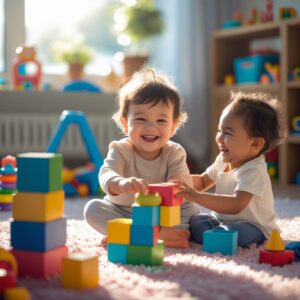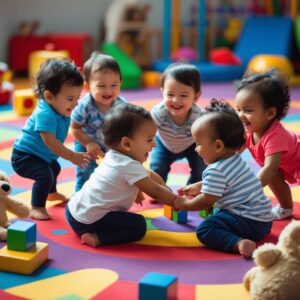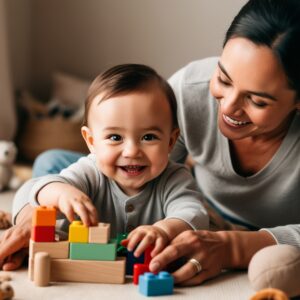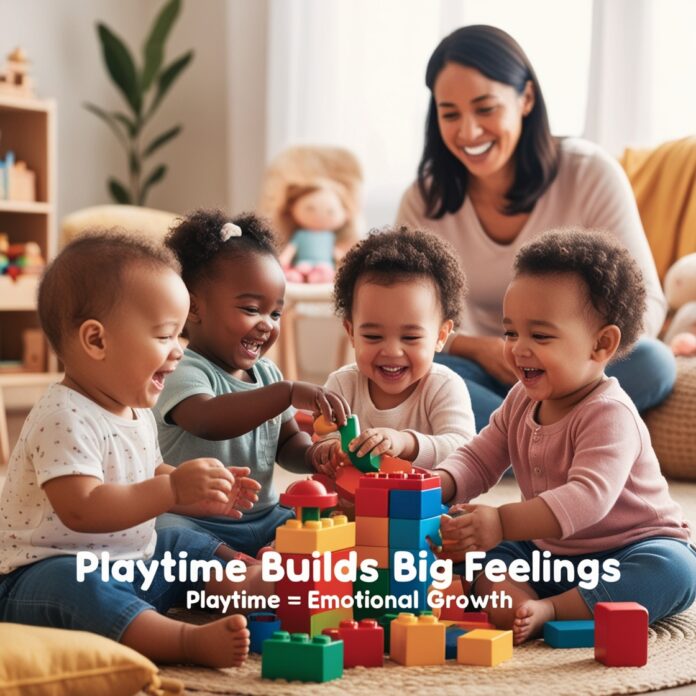Parents and caregivers can no doubt say that watching your child grow and learn new things are one of the most satisfying parts of the toddler stage. Among the things that help these changes take place, playtime, on the one hand, is considered to be the most important endeavor. The play not only gives children the possibility to enjoy and perform their creative best but also is a major building block of their social and emotional development process. In this article, we focus on the impact of the play in modeling toddlers‘ abilities to self-regulate emotionally, to enhance their social skills, and positive well-being. We are also going to discuss how you can make playtime an enjoyable and still a learning experience for your child’s development through practical tips afforded.

Role of Playtime in Toddler’s Sense of Self and Social Skills
Play not only entertains toddlers but also is a fundamental element of emotional and social self. In this period, children are in the process of learning to express their feelings, recognizing others’ feelings, and interacting with other people. Play allows toddlers to practice these skills without any risk and enjoy it.
1. Social Skill Development
One of the evident benefits of play for a toddler’s growth is that it is an excellent tool for developing social skills. Kid’s playing with friends, adults, and imaginary companions learn communication, sharing, turn-taking, and cooperation, among other things. The method is practical for establishing relationships, solving conflicts, and in future group scenarios as well.

Children become aware that other people have feelings and they begin to have a sense of other people’s emotions as well as the way to respond in an appropriate way. As children have social interactions while playing, they start to achieve not only the skill but also the confidence to communicate well with others in the future. Effective ongoing development can be guaranteed using this approach. Empathy is a required life skill that is developed with the help of teachers, families, and caregivers. Empathy can be taught in various ways, using storytelling, role-playing, or even walking in someone else’s shoes. It is essential to start the process of learning from early childhood.
2. Emotional Regulation
More than social skills, playtime is a very essential factor in toddlers having a strong basis to regulate their emotions. When playing, kids can have feelings of being frustrated, excited, happy, or even sad. It’s the process of these little ones to learn how to deal with their emotions while in a healthy place and this is a very important part of the mental health of the child. Through play, children can react emotionally to different situations and learn how to deal with them.

For instance, if a toddler gets upset as a result of losing a game or is incapable of completing a task, he/she might take this as an opportunity to get practice on calming themselves down, asking for help or solving a problem. The moments of emotional suffering and learning are what are the most important in helping children understand their feelings and building resilience.
3. Self-Confidence and Independence
Playtime contributes to building a sense of self-confidence and independence in toddlers, too. A young child builds self-esteem and confidence by successfully performing activities like making a tower of blocks, arranging a puzzle, or playing make-believe games. Consequently, they are encouraged to overcome newer hurdles.
Besides as they are independent learners, the toddlers develop their autonomy as well. Playing independently helps them to learn a huge deal, for example, making choices, and exploring what’s around them. Being able to do things by themselves is a basis for emotional and personal dependability that they will keep when they get older.
How to Make Playtime Beneficial for Social and Emotional Development
While all forms of play are important for toddlers, some though are able to be more targeted towards kids’ social and emotional growth. Here are some useful suggestions for making playtime more comprehensive and substantial.
1. Support Pretend Play
Pretend play, also referred to as imaginative or role-playing, is a very effective way to make sure the toddlers are growing emotionally and socially. When children take on the roles of different characters, animals, or superheroes, they start to become empathic and understand the various perspectives. Moreover, kids are learning how people will react to different situations that will make them the best companion when they have such emotions and take part in different societal dynamics.
For instance, you can help your toddler become involved in creating situations where they can play the role of a doctor, teacher, or parent. These kinds of games are very effective since they enable children to be able to understand others’ feelings and also be able to learn about emotions like for example, taking care of a “sick” person or consoling a “friend.”
2. Engage in Co-Play
The majority of the toddlers get the most information from playing, particularly when they interact with other kids or grown-up individuals. Plan play-dates or join group activities in which your child can practice social skills such as sharing, cooperation, and taking turns. As they interact with others, they will be able to read whether a person is pleased or not by the way they act as well as make friends and solve their own problems.
One should definitely get involved in the play, especially when a conflict occurs, and guide it as necessary. Teach the child how to express his feelings by words and the right way to solve the problems amicably. This will create the understanding of not only the child’s emotions but also those of the others.
3. Give Endless-Option Toys
Toys with which children can do whatever they like, such as building blocks, dolls, or painting supplies, are very good tools for emotional expression, and also for creativity. These toys not only let children make up exciting plays but also give them the right to make decisions, which in turn helps to develop their independence as well as the skill of problem-solving. Furthermore, endless-option toys also invigorate the power of imagination, which, in the end, is mandatory for someone who is cultivating emotional intelligence.
4. Model Positive Social Behavior
Kids are very perceptive and, in many cases, pick up the actions that they see in adults. When playing with your little one, it is good to show them polite and sociable conducts like patience, active listening, and empathy. In this way, you show your child that kindness and understanding are the best ways to work out social problems and conflicts.
5. Incorporate Calm-Down Techniques
Regardless of its nature, playtime can sometimes lead to an overflow of emotions in toddlers, who are yet to master ways of emotional regulation. Therefore, the parents should introduce foolproof soothing methods such as taking a deep breath or mental counting which can assist toddlers in keeping emotional balance within them. These strategies are the ones that can be put in place when children are playing so that they learn how to dial down their emotional side when it is overwhelmed.
The Long-Term Benefits of Playtime for Social and Emotional Growth
The abilities that are gained during play are notably significant as far as a person’s future social and emotional status are concerned. Young children, who are given structured opportunities to partake in focused play, have all the necessary life skills to willingly and confidently go through the various stages of growing up. This will allow them to easily face up to peer interaction, emotional stress and still have a positive self-image.
Additionally, as per studies, kids who engage in regular and monitored play are likely to become adults with good emotional intelligence, strong social competence, sustained academic performance. It is quite clear, therefore, that playtime acts as the underpinning of one’s success in emotional and social lifestyle for a lifetime.

Playtime is not just an escape from the daily grind of routine; it is also a means to define the emotional and social confines of a child. Knowing what kind of play the child likes and offering opportunities to play in a way that the child is learning are two ways in which parents can enhance their children’s skills which will be effective for them throughout their life. Pretend play, games with another person, or even going solo in the exploration are all examples from a wide palette of playtime activities which you can utilize to secure your child’s forthcoming emotional and social state.



